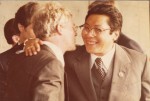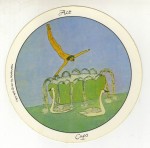“The whole point is to take care of one another. Help each other………. Men [I like to use the Jungian concept of “animus”— in this case negative animus”— rather than “men,” because it is a component that women have as well] don’t listen. They are closed off. They’ve got all the testosterone but women [I like to use the Jungian concept of “anima”— both positive and negative — rather than “women,” because it is a component that men have as well] are much more powerful. They intuitively understand the power of love and goodness and kindness…..Ego with its fear and guilt keeps people from properly helping others…… The most basic emotion is love……..”<source of quote: my doctor; July 03, 2013, Toronto, Canada> Please note: as I understand it, both positive and negative are part of ultimate basic goodness.
One of my doctors — a Canadian icon in the field of integrative medicine — is a popular lecturer and author. So I shouldn’t have been surprised by his soliloqy when I went to see him for my quarterly appointment. But I was. I mean, although he’s a voluble guy, I have never seen this display before. It is fabulous. This soliloqy goes on non-stop for three or four minutes.
I feel that his office has become a stage from which he is proclaiming the good news! The good news of basic goodness.
You see, I have I just spent a week (from May 25 – July 02, 2013) in the wrap-around sky of Juniper Hill Retreat Centre participating in a Shambhala Meditation retreat lead by Patricia Ullman Hayward, former director of Dorje Denma Ling .
The retreat group of 11 participants is poised to experience a great paradigm shift (I think of it as nothing less than a revolution), the “push” the Sakyong is making right now to create enlightened society and introduce us to our own basic goodness.
It is only on July 03’13, the day after I return to Toronto from the weekthun, when I hear my doctor “hold forth” on basic goodness, that I realize how powerful the three-step process of Shambhala meditation is.
Another way to put this is that I feel certain that my doctor was reflecting back to me the results of a week-long practice — results that included touching the actual face of my own basic goodnes in all its many manifestations, e.g. feelings, thoughts, emotions.
Patricia told us that Sakyong Mipham Rinpoche asked her in February whether Shambhala meditation changed the culture <my emphasis>at a recent winter dathun (month of meditation). By the last day it was very palpable that we had created a culture of kindness. The weekthun had roused my motivation and confidence. The other participants also spoke about the power and inspiration arising from touching our vulnerability, our appreciation. <source: Jacquline Larson: Back to Basic Goodness, Beginner’s Mind and Butter Tarts on a First Weekthun>
As is customary at Juniper Hill, we have our celebratory supper at the end of the weekthun. There are the toasts to our teachers. And then the entertainment.
Suzanne Bassett from Ottawa read her own poem. Here it is.
a story poem for drum accompaniment
by Suzanne Bassett
at Juniper Hill, May 25-June 2, 2013
In the jungle of my mind,
Tiger walks
on soft, strong paws,
content in her beautiful skin.In the jungle of my mind,
Tiger sees
a waterfall of thoughts,
a geyser of emotions,
a roiling pool of memories and dreams,
hopes and fears,
broken battlements,
and barriers hastily erected
to protect against an unknown foe.In the jungle of my mind,
Tiger sees
a gerbil on a wheel,
little paws turning the wheel of time
faster and faster and faster
frantic breath fast and hot.Tiger says
Little sister
rest,
dip your tired paws
into the ocean of basic goodness.
Remember, little one,
you are worthy just as you are.
All you need is to relearn how to be.Feel your heart, your
strong heart
whole heart
worthy heart
alive heart
remembering heart
awakened heart
warrior heart.The blade of nowness
severs the shackles of the cocoonAnd we take our seats
at the celebration, where we belong.
Home at last.
For some well-crafted descriptions of one of the participant’s experiences of the practice, please see the webpost by Jaqueline Larson, Toronto:

Jacqueline Larson, retreat participant, and Louis Allen, one of the stewards of Juniper Hill Retreat Centre.
If you would like to make a comment, please click on the light blue-coloured Comment button at the end of the webpost.
If you found this post helpful, please share it with a friend. Then consider subscribing to the weblog by clicking on the Subscribe button in the navigation bar and following one of three sets of simple instructions.
Thank you.






